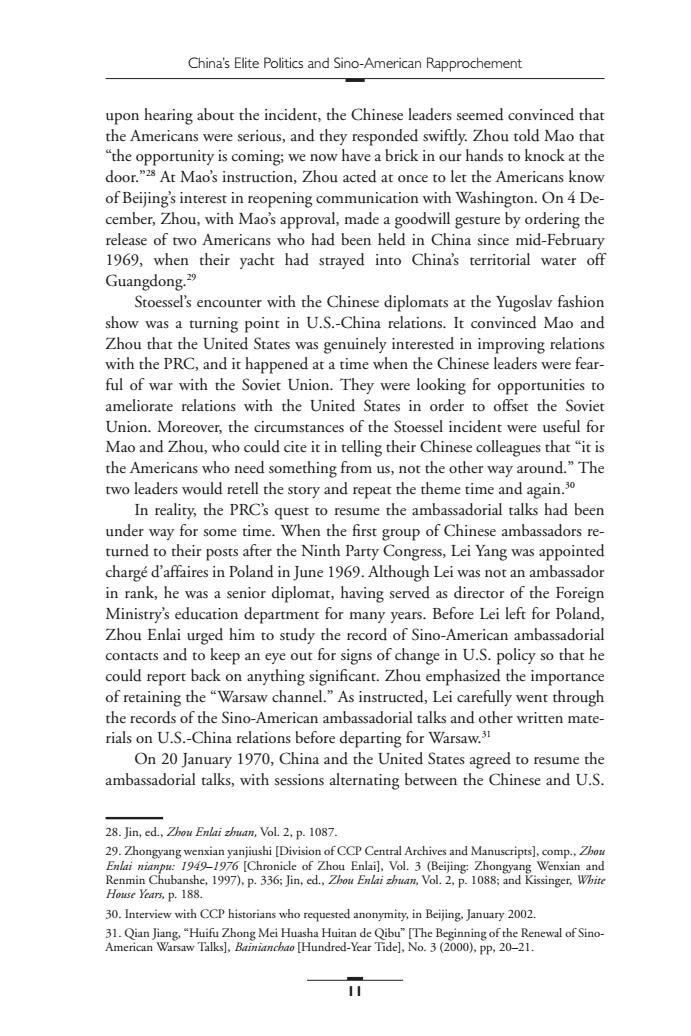正在加载图片...

China's Elite Politics and Sino-American Rapprochement upon hearing about the incident,the Chinese leaders seemed convinced that the Americans were serious,and they responded swiftly.Zhou told Mao that "the opportunity is coming;we now have a brick in our hands to knock at the door."28 At Mao's instruction,Zhou acted at once to let the Americans know of Beijing's interest in reopening communication with Washington.On 4 De- cember,Zhou,with Mao's approval,made a goodwill gesture by ordering the release of two Americans who had been held in China since mid-February 1969,when their yacht had strayed into China's territorial water off Guangdong.” Stoessel's encounter with the Chinese diplomats at the Yugoslav fashion show was a turning point in U.S.-China relations.It convinced Mao and Zhou that the United States was genuinely interested in improving relations with the PRC,and it happened at a time when the Chinese leaders were fear- ful of war with the Soviet Union.They were looking for opportunities to ameliorate relations with the United States in order to offset the Soviet Union.Moreover,the circumstances of the Stoessel incident were useful for Mao and Zhou,who could cite it in telling their Chinese colleagues that"it is the Americans who need something from us,not the other way around."The two leaders would retell the story and repeat the theme time and again.3 In reality,the PRC's quest to resume the ambassadorial talks had been under way for some time.When the first group of Chinese ambassadors re- turned to their posts after the Ninth Party Congress,Lei Yang was appointed charge d'affaires in Poland in June 1969.Although Lei was not an ambassador in rank,he was a senior diplomat,having served as director of the Foreign Ministry's education department for many years.Before Lei left for Poland, Zhou Enlai urged him to study the record of Sino-American ambassadorial contacts and to keep an eye out for signs of change in U.S.policy so that he could report back on anything significant.Zhou emphasized the importance of retaining the"Warsaw channel."As instructed,Lei carefully went through the records of the Sino-American ambassadorial talks and other written mate- rials on U.S.-China relations before departing for Warsaw. On 20 January 1970,China and the United States agreed to resume the ambassadorial talks,with sessions alternating between the Chinese and U.S. 28.Jin,ed.,Zhou Enlai zhuan,Vol.2,p.1087. 29.Zhongyang wenxian yanjiushi [Division of CCP Central Archives and Manuscripts].comp.,Zhou Enlai nianpu:1949-1976 [Chronicle of Zhou Enlai],Vol.3 (Beijing:Zhongyang Wenxian and Renmin Chubanshe,1997),p.336;Jin,ed.,Zhou Enlai zhuan,Vol.2,p.1088;and Kissinger,White House Years,p.188. 30.Interview with CCP historians who requested anonymity,in Beijing.January 2002 31.Qian Jiang,"Huifu Zhong Mei Huasha Huitan de Qibu"[The Beginning of the Renewal of Sino- American Warsaw Talks],Bainianchao [Hundred-Year Tide],No.3(2000),pp,20-21.upon hearing about the incident, the Chinese leaders seemed convinced that the Americans were serious, and they responded swiftly. Zhou told Mao that “the opportunity is coming; we now have a brick in our hands to knock at the door.”28 At Mao’s instruction, Zhou acted at once to let the Americans know of Beijing’s interest in reopening communication with Washington. On 4 December, Zhou, with Mao’s approval, made a goodwill gesture by ordering the release of two Americans who had been held in China since mid-February 1969, when their yacht had strayed into China’s territorial water off Guangdong.29 Stoessel’s encounter with the Chinese diplomats at the Yugoslav fashion show was a turning point in U.S.-China relations. It convinced Mao and Zhou that the United States was genuinely interested in improving relations with the PRC, and it happened at a time when the Chinese leaders were fearful of war with the Soviet Union. They were looking for opportunities to ameliorate relations with the United States in order to offset the Soviet Union. Moreover, the circumstances of the Stoessel incident were useful for Mao and Zhou, who could cite it in telling their Chinese colleagues that “it is the Americans who need something from us, not the other way around.” The two leaders would retell the story and repeat the theme time and again.30 In reality, the PRC’s quest to resume the ambassadorial talks had been under way for some time. When the ªrst group of Chinese ambassadors returned to their posts after the Ninth Party Congress, Lei Yang was appointed chargé d’affaires in Poland in June 1969. Although Lei was not an ambassador in rank, he was a senior diplomat, having served as director of the Foreign Ministry’s education department for many years. Before Lei left for Poland, Zhou Enlai urged him to study the record of Sino-American ambassadorial contacts and to keep an eye out for signs of change in U.S. policy so that he could report back on anything signiªcant. Zhou emphasized the importance of retaining the “Warsaw channel.” As instructed, Lei carefully went through the records of the Sino-American ambassadorial talks and other written materials on U.S.-China relations before departing for Warsaw.31 On 20 January 1970, China and the United States agreed to resume the ambassadorial talks, with sessions alternating between the Chinese and U.S. 11 China’s Elite Politics and Sino-American Rapprochement 28. Jin, ed., Zhou Enlai zhuan, Vol. 2, p. 1087. 29. Zhongyang wenxian yanjiushi [Division of CCP Central Archives and Manuscripts], comp., Zhou Enlai nianpu: 1949–1976 [Chronicle of Zhou Enlai], Vol. 3 (Beijing: Zhongyang Wenxian and Renmin Chubanshe, 1997), p. 336; Jin, ed., Zhou Enlai zhuan, Vol. 2, p. 1088; and Kissinger, White House Years, p. 188. 30. Interview with CCP historians who requested anonymity, in Beijing, January 2002. 31. Qian Jiang, “Huifu Zhong Mei Huasha Huitan de Qibu” [The Beginning of the Renewal of SinoAmerican Warsaw Talks], Bainianchao [Hundred-Year Tide], No. 3 (2000), pp, 20–21